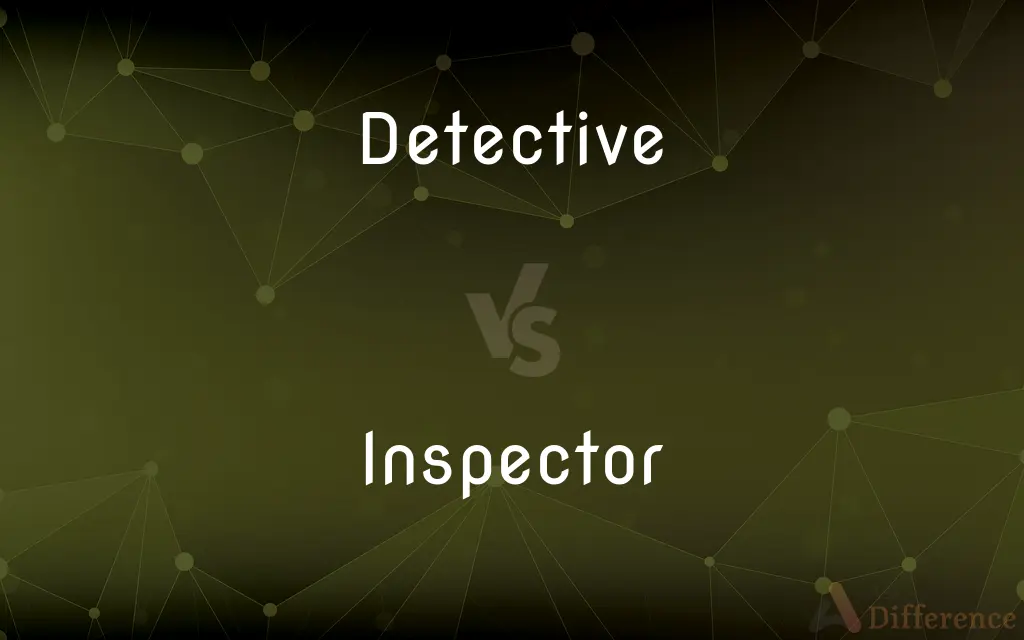Detective vs. Inspector — What's the Difference?
By Tayyaba Rehman — Updated on October 11, 2023
A detective is a police officer specialized in investigating crimes. An inspector is a higher-ranked police official or someone examining specific items or conditions. Their roles and ranks differ across police departments.

Difference Between Detective and Inspector
Table of Contents
ADVERTISEMENT
Key Differences
A detective is primarily a police officer whose primary role is to investigate crimes. This individual delves deep into gathering evidence, interviewing witnesses, and putting together the pieces of a criminal puzzle. Detectives usually work on cases that require in-depth investigation, including homicides, thefts, and frauds. In contrast, an inspector is often a higher-ranked police official, overseeing and managing a group of officers or detectives. Their responsibilities can include supervising investigations and ensuring that procedures are followed correctly.
While the role of a detective is more hands-on, diving deep into the intricacies of criminal cases, an inspector's role can be more managerial. Inspectors review the work of detectives and other officers, ensuring the quality and integrity of investigations. They also often liaise with other departments or agencies and are involved in strategic planning. Detectives, on the other hand, are immersed in the investigative process, conducting surveillance, and gathering intelligence.
In some jurisdictions, the term "inspector" might not necessarily refer to a police official. It could denote someone who examines specific items, conditions, or situations to ensure they meet set standards. For instance, a building inspector examines the structural safety of buildings. Detectives, irrespective of jurisdiction, remain closely tied to law enforcement and criminal investigations.
The path to becoming a detective or an inspector varies. Typically, a detective starts as a regular police officer and, after gaining experience and undergoing additional training, can move into a detective role. Inspectors, being higher in rank, often require more years of experience, and in some cases, additional examinations or qualifications might be necessary.
Lastly, the tools and methods used might differ between the two. While both rely on investigative techniques, a detective might employ forensic tools, undercover operations, and informants more frequently. An inspector, being in a supervisory role, often uses management tools, analytics, and reports to oversee operations and make informed decisions.
ADVERTISEMENT
Comparison Chart
Primary Role
Investigating crimes and gathering evidence.
Supervising officers and ensuring procedural adherence.
Rank
Typically below an inspector in police hierarchies.
Often a higher-ranked police official.
Tool Usage
Forensic tools, undercover operations, informants.
Management tools, analytics, reports.
Path to Position
Start as police officer, then specialized training.
Years of experience, possibly additional qualifications.
Scope
Focused on specific cases or crimes.
Broader oversight, can include strategic planning.
Compare with Definitions
Detective
A law enforcement agent delving into unsolved cases.
The detective interviewed multiple witnesses to piece the story together.
Inspector
A higher-ranked police official overseeing investigations.
The inspector reviewed all case files before the trial.
Detective
An officer using various methods to solve crimes.
With the help of informants, the detective brought the criminal syndicate down.
Inspector
An individual examining specific items or conditions for standards.
The building inspector found several safety violations.
Detective
Someone who uncovers hidden information in criminal matters.
The detective uncovered a plot that was deeper than initially thought.
Inspector
A supervisory figure in law enforcement hierarchies.
The inspector held a meeting to discuss the new policing strategies.
Detective
A detective is an investigator, usually a member of a law enforcement agency. They often collect information to solve crimes by talking to witnesses and informants, collecting physical evidence, or searching records in databases.
Inspector
Someone who ensures procedural and regulatory compliance.
The health inspector visited the restaurant after a complaint.
Detective
A person, usually a member of a police force, who investigates crimes and obtains evidence or information.
Inspector
A professional reviewing and evaluating operational practices.
The inspector provided feedback on improving the department's efficiency.
Detective
Of or relating to detectives or their work
Detective novels.
Inspector
Inspector is both a police rank and an administrative position, both used in a number of contexts. However, it is not an equivalent rank in each police force.
Detective
Suited for or used in detection.
Inspector
One who is appointed or employed to inspect something.
Detective
(law enforcement) A police officer who looks for evidence as part of solving a crime; an investigator.
Inspector
A police officer ranking next below superintendent.
Detective
A person employed to find information not otherwise available to the public.
Inspector
A person employed to inspect something.
Detective
Employed in detecting.
Inspector
(law enforcement) A police officer ranking below superintendent.
Detective
Fitted for, or skilled in, detecting; employed in detecting crime or criminals; as, a detective officer.
Inspector
(computing) A software tool used to examine something.
Detective
One who business it is so detect criminals or discover matters of secrecy.
Inspector
One who inspects, views, or oversees; one to whom the supervision of any work is committed; one who makes an official view or examination, as a military or civil officer; a superintendent; a supervisor; an overseer.
Detective
A police officer who investigates crimes
Inspector
A police officer, typically holding a rank one below superintendent, and in some cases in charge of several precincts; as, inspector Clousseau is investigating the case.
Detective
An investigator engaged or employed in obtaining information not easily available to the public
Inspector
A high ranking police officer
Detective
A police officer specialized in investigating crimes.
The detective worked tirelessly to solve the complex murder case.
Inspector
An investigator who observes carefully;
The examiner searched for clues
Detective
An individual trained in gathering and analyzing evidence.
The detective used advanced forensic tools to trace the culprit.
Common Curiosities
Is an Inspector always associated with law enforcement?
No, the term "inspector" can also refer to professionals examining specific items or conditions, like building inspectors.
Do detectives only work on major crimes?
While detectives often handle major crimes, they can also investigate a range of offenses, from thefts to frauds.
What is a Detective's primary role?
A detective is primarily responsible for investigating crimes and gathering evidence.
How does one become a Detective?
Typically, one starts as a regular police officer, gains experience, and then moves into a detective role after specialized training.
Are detectives and inspectors found worldwide?
Yes, while titles and exact roles might vary, most countries have equivalents to detectives and inspectors in their policing systems.
How does an Inspector differ from a Detective in policing?
An inspector is usually a higher-ranked official overseeing and managing officers, including detectives.
Can a Detective become an Inspector?
Yes, with experience and possibly additional training or exams, a detective can be promoted to higher ranks, including inspector.
What qualifications are needed for an Inspector position?
Inspectors usually require years of policing experience, and additional qualifications might be necessary depending on the jurisdiction.
What skills are crucial for a Detective?
Critical thinking, attention to detail, investigative skills, and strong communication are vital for a detective.
What responsibilities might an Inspector have in a police department?
Inspectors often supervise officers, review investigations, ensure procedural adherence, and sometimes engage in strategic planning.
Share Your Discovery

Previous Comparison
Parish vs. Perish
Next Comparison
Mansion vs. EstateAuthor Spotlight
Written by
Tayyaba RehmanTayyaba Rehman is a distinguished writer, currently serving as a primary contributor to askdifference.com. As a researcher in semantics and etymology, Tayyaba's passion for the complexity of languages and their distinctions has found a perfect home on the platform. Tayyaba delves into the intricacies of language, distinguishing between commonly confused words and phrases, thereby providing clarity for readers worldwide.















































